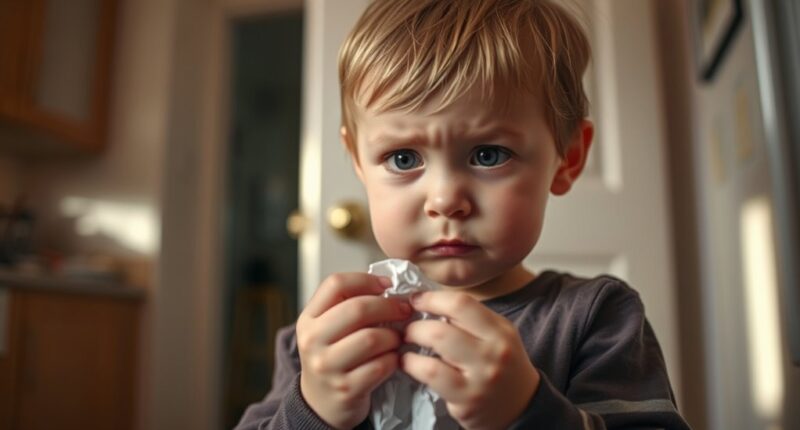When your child lies, it’s often because they’re trying to navigate their social world, protect their feelings, or seek approval. As they grow, they learn social norms, and their honesty evolves. Sometimes, they imitate others or want to avoid punishment. Creating a safe, understanding environment helps them feel secure and reduces the need to lie. If you want tips on guiding your child toward honesty, discovering more can help you support their development effectively.
Key Takeaways
- Recognize that children may lie to protect themselves, navigate social cues, or seek approval, often as part of their development.
- Understand that age and developmental stage influence a child’s understanding of honesty and their reasons for lying.
- Observe social influences, such as media or peer behavior, which can shape a child’s tendency to lie.
- Create a safe, supportive environment to reduce fear and shame that may lead children to lie as self-protection.
- Respond with empathy, model honesty, and guide children gently to foster trust and promote truthful behavior.

Children lie for various reasons, often as a way to navigate their social world or protect themselves. Understanding why your child might be dishonest can help you respond more effectively and support their healthy development. One key factor is truth development, which is a gradual process in children as they learn what honesty means and how to communicate it. Young children may not fully grasp the difference between reality and imagination, or they might not yet understand the impact of lying. As they grow, they start to understand social norms and expectations, but their grasp of honesty is still evolving. They might lie to avoid punishment, to gain approval, or simply because they’re still figuring out how to express themselves truthfully. Recognizing this developmental stage can help you approach their behavior with patience and guidance.
Children lie as they learn honesty and navigate social cues with patience and guidance.
Social influences play a significant role in shaping when and why children lie. Kids are highly impressionable and often look to their peers, family members, or media for cues on what’s acceptable. If they see others bending the truth without consequences or hear stories where lying seems justified, they may imitate those behaviors. Peer pressure, in particular, can lead children to lie to fit in or avoid embarrassment. Additionally, family dynamics influence honesty; if you notice that your child’s environment is filled with conflicting messages about honesty—like telling the truth but punishing honesty harshly—they might resort to lying as a way to cope or avoid conflict. Children learn social cues early on, and their lying can be a reflection of their attempts to navigate complex social landscapes.
It’s also essential to contemplate that children often lie to protect themselves emotionally. For example, if they fear punishment or disappointment, they might craft stories to shield themselves from blame or shame. This form of lying isn’t necessarily malicious but a defense mechanism rooted in their desire to feel safe and accepted. As a parent, understanding these social influences and the stages of truth development can help you create a supportive environment where honesty is encouraged without fear of harsh judgment. Instead of reacting with anger or punishment, you can gently guide your child toward understanding the importance of honesty and help them learn from their mistakes.
Furthermore, understanding the role of emotional safety in honesty can help you foster trust and openness in your relationship with your child. In essence, children lie because they are learning how to navigate their social worlds and develop their understanding of truth. Recognizing that social influences and their developmental stage are at play allows you to approach lying with empathy and patience. By fostering open communication and modeling honesty yourself, you can help your child grow into someone who values truthfulness and feels safe being honest.
Frequently Asked Questions
How Can I Tell if My Child’s Lie Is Harmless or Problematic?
To determine if your child’s lie is harmless or problematic, observe their trustworthiness assessment and honesty indicators. If they lie occasionally to avoid trouble or impress peers, it’s usually harmless. However, frequent dishonesty or lies about serious issues may signal deeper problems. Pay attention to their motivation, consistency, and context. Open conversations help you gauge sincerity and reinforce honesty, guiding your response to support healthy development.
At What Age Should I Be Concerned About Lying?
You might wonder when to worry about your child’s lying. Generally, around age 3 or 4, children start grasping honesty, but occasional fibs are normal developmental milestones. As a parent, use positive parenting strategies to guide them. If dishonesty persists or increases past age 5, it’s time to contemplate concerns. Stay patient, set clear boundaries, and foster open communication to help your child develop honesty as they grow.
How Do Cultural Differences Influence Children’s Honesty?
Cultural differences considerably influence your child’s honesty, as cultural norms shape honesty expectations. In some cultures, children may feel freer to bend the truth to maintain harmony or show respect, while others emphasize strict honesty. You should consider these cultural influences when evaluating your child’s honesty, recognizing that varied norms can affect how children understand and express truthfulness. Embracing these differences helps guide your parenting approach more effectively.
Can Frequent Lying Be a Sign of Emotional Issues?
You might think your child’s constant lying is just a phase, but it could be a red flag for deeper emotional issues. Peer influence and difficulty expressing feelings often lead kids to lie more. If lying becomes frequent, it might signal they’re struggling to handle emotions or peer pressure. Pay close attention, encourage emotional expression, and foster open conversations to help your child navigate these challenges before they escalate.
What Are Effective Ways to Encourage Honesty in My Child?
To encourage honesty, focus on trust-building strategies by creating a safe space where your child feels comfortable sharing. Have age-appropriate conversations that emphasize the importance of honesty and listen without judgment. Reinforce positive behavior with praise and avoid harsh punishments for mistakes. Consistently model honesty yourself, and over time, your child will learn that truthfulness is valued and safe in your relationship.
Conclusion
When your child lies, you can see it as a chance to teach, to guide, to grow. Recognize the reasons behind their words, respond with patience, and set clear boundaries. Understand that honesty builds trust, and trust builds connection. By staying calm, by staying consistent, and by staying compassionate, you help your child learn right from wrong. Together, you can turn every lie into an opportunity for understanding, for growth, for strengthening your bond.









